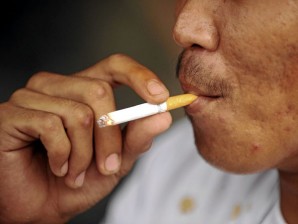MANILA, Philippines–A “sin tax” on cigarettes and alcohol—part of a government bid to boost finances—dampened the New Year spirit when it took effect throughout the country Tuesday in the midst of celebrations.
Many stores started selling tobacco and alcoholic products at inflated prices before midnight, ahead of the official implementation of the tax hikes on Jan. 1, hitting party-goers in the pocket.
The tax on cigarettes will gradually be raised to P30 per pack by 2017, roughly doubling the current price to around P52.
The duty on alcohol will also increase gradually until 2017, raising the price of a bottle of beer by P23.50, with varying levels for other drinks, including wine and spirits. It will be further increased by four percent each year thereafter.
“The new prices compared to other countries, like Singapore for example, are still low but for ordinary Filipinos they are expensive,” said Laudemer Angeles, a 33-year-old store owner in Bacoor, Cavite.
“Many of my customers were complaining about the higher prices and were not too happy when they bought their liquor and cigarettes for their parties last night,” Angeles said.
But for antismoking campaigner Emer Rojas, he hoped the new taxes would lead to a gradual decline in the number of people suffering from tobacco-related illness.
“I think the sin taxes should be raised even higher,” he told AFP. “But we commend President Aquino for showing his resolve in signing the law.”
The government has said that the country of 100 million has the highest incidence of smoking in the region, with tobacco-related diseases costing the country P177 billion last year.
The new taxes aim to raise P33 billion this year alone, gradually increasing over the coming years.
A large percentage of the money will go towards the government’s health care program.
The government first asked Congress to raise taxes on “sin” products as far back as 1997, but a strong lobby by tobacco manufacturers blocked any measures.
The lobby included members of Congress who represented tobacco-growing regions as well as powerful cigarette companies that enjoyed one of the lowest tobacco taxes in Southeast Asia.
